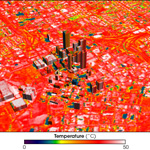Urban Heat Island Effect
c) How Climate Change Will Affect UHI

Urban heat island is problem effecting cities all around the world through increased temperature, degradation of air and water quality, and negative impacts to human health. Currently UHI mitigation strategies do not consider how climate change might affect UHI; UHI is viewed as a current problem, while climate change is viewed as a future problem or in some cases not a problem at all. Increasingly, especially in the broader sense of green building, climate change is factored into mitigation, not only with respect to UHI but natural hazards or even city/regional planning.
Although climate change is not typically the major factor in UHI mitigation, the potential impacts of climate change on cities have been recognized by the IPCC (IPCC, 2011). These impacts include fewer periods of extreme winter cold, an increased frequency of heat waves, air and water pollution episodes, rising sea levels and increase risk of storm surge, changes in the timing, frequency and severity of urban flooding associated with more intense precipitation events (IPCC, 20001). Combining the impacts of climate change with UHI illustrates the importance of addressing these issues together. Climate change could simply magnify current problems associated with UHI.
For example, one potential impact the IPCC addresses was an increased frequency of heat waves (IPCC, 2001). In their analysis, instead of one isolated incidence every 2-5 years, there could be fatal heat waves every summer, or perhaps several times each summer. Another IPCC impact example was air and water pollution episodes. Currently cities are trying different mitigation strategies to reduce the effects UHI on the air and water quality. In combination with climate change, these problems may worsen. The IPCC expects climate change to affect the outdoor air quality of large urban areas through the production, transport, dispersal and deposition of pollutants (Wilby, 2008). In conjunction with UHI, an increase in the frequency/intensity hot weather will “favor the creation of more temperature inversions trapping pollutants in the near-surface layer of the atmosphere” (Wilby, 2008).
These are only two examples of how climate change could impact UHI. Unfortunately the impacts of climate change on UHI are unknown. However, with global warming, an increased frequency of heat waves and severity will certainly amplify the current problems associated with UHI. Therefore it is important to account for climate change in mitigation planning for UHI.
Section a) Introduction (HOME)
Section b) Why is Urban Heat Island a Concern?
Section c) How Climate Change will Affect UHI
Section d) Measuring the Urban Heat Island Effect (NEXT)
Section e) How can Urban Heat Island be Remediated?
Section f) Mitigation at Local/Regional/National Level
(By Kiersten Lee/Gregory Möller)

